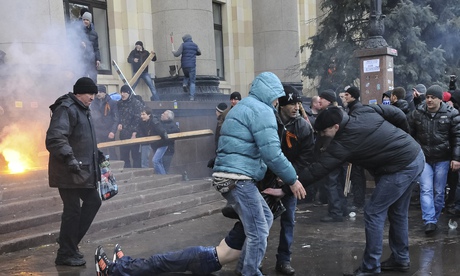Cold War II
Crimea’s relationship with Russia brings back tensions with the West

Photo by: Stringer/Reuters
Pro-Russian protesters drag a wounded comrade away in Kharkiv following clashes with supporters of Ukraine’s new government on 1 March.
Recent action taken by Russia in Crimea has begun to make the future of Russian- Western relations very unclear. Increased Russian military presence and sanctions on high Russian officials by the U.S. has left us on the brink of a possible ‘Cold War II’.
In response to the Ukrainian government’s announcement in November that it would rather strengthen ties with Moscow than Europe, anti- Russian protesters took to the streets showing their discontent with the direction Ukraine wanted to take. Violence escalated quickly with over 90 deaths and according to BBC News, Ukrainian Prime Minister Mykola Azarov and his government resigned on Jan. 28 to respond to the unsatisfactory actions of his administration and to flee from the violence. Parliament named speaker Olexander Turchynov as interim president on Feb. 23.
Claiming to be protecting Russian interests in the Autonomous Republic of Crimea, Russian President Vladimir Putin got approval from his Parliament to use force in Ukraine on March 1 and the next day the U.S. announced that Russia had complete control of Crimea. President Barack Obama pledged to stand with Ukraine on March 12 and Europe provided money and support to help Ukraine create a 60,000 strong National Guard to defend the country.
On March 16, a referendum to join Russia and succeed from Ukraine showed that 97% of the Crimean population wanted to join. According to the 2001 Ukrainian population census, 58% of the population is ethnically Russian and 24% are ethnic Ukrainians. Claiming historic and economic ties to Crimea, President Putin drafted a bill to add the peninsula to the Russian Federation.
Over the referendum, the U.S. and E.U. imposed travel bans and asset freezes to many Russian and Ukrainian officials; what many view as Cold War like tendencies.
Major debate has started among the international community and most blame one side over the other. However junior and Russian native Alina Nilova said, “Both countries are wrong in what they’re doing. America is getting too involved in a conflict that doesn’t concern them and Russia needs stop its ‘land grab’.”
On March 18 the first Ukrainian soldier in a Crimean base that was controlled by Russian forces was killed.
The possibility of a second Cold War is beginning to seem more likely, but all we can hope for is peace.

